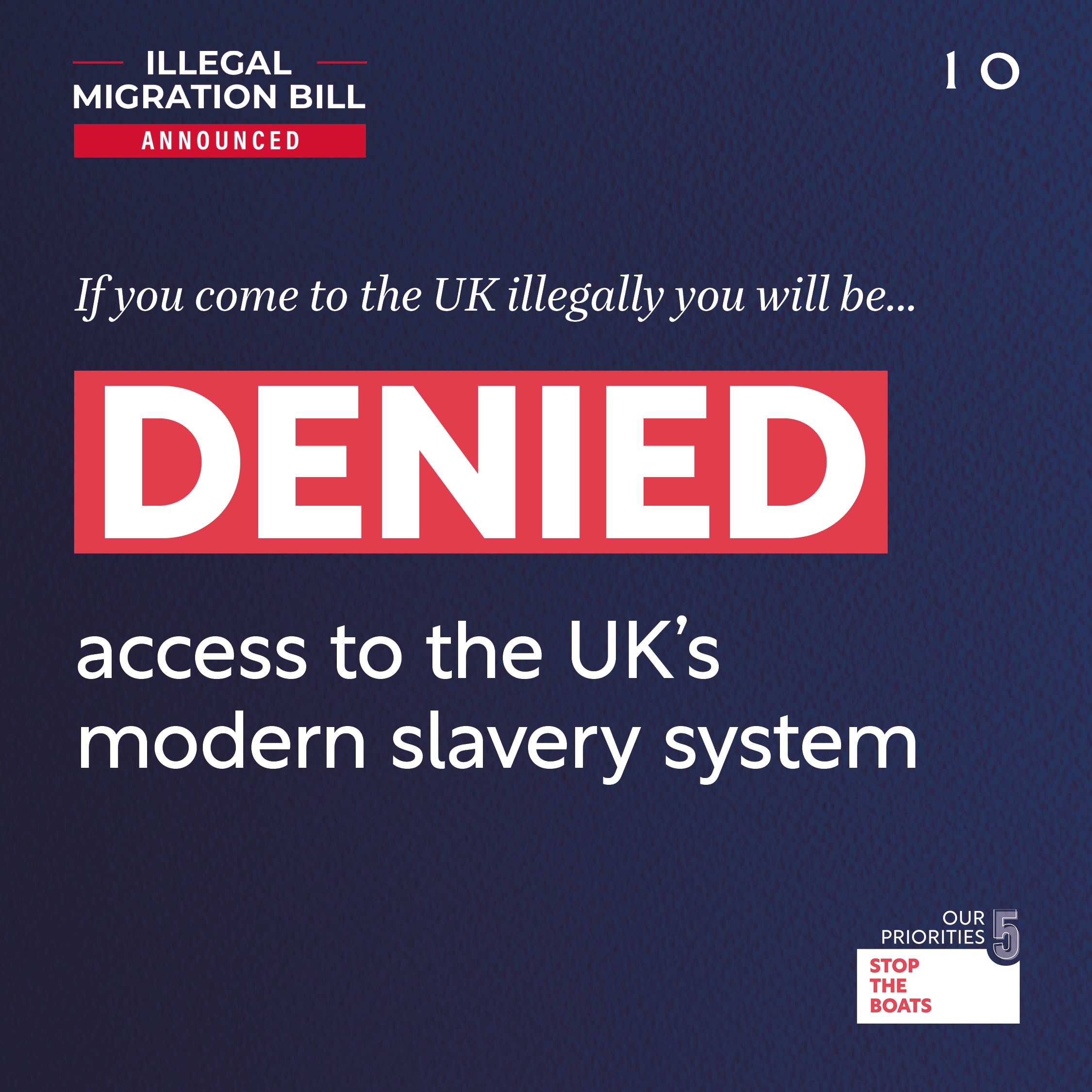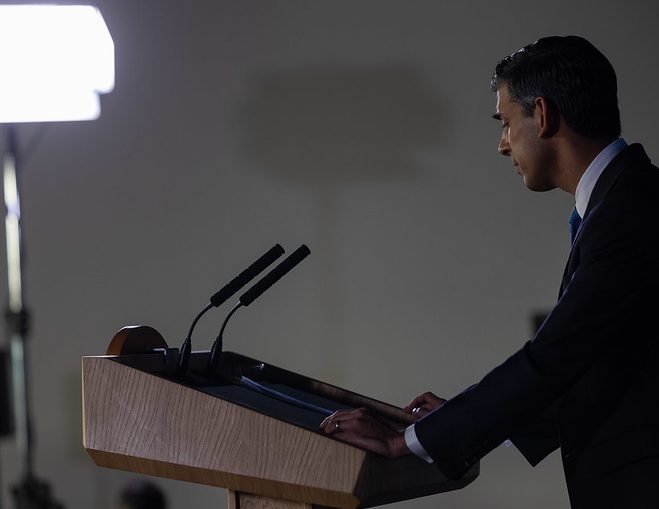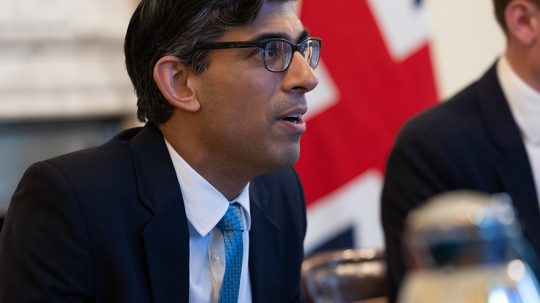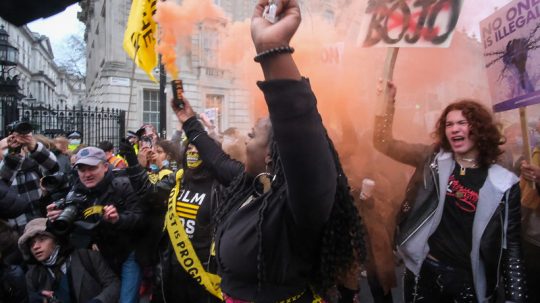Following the publication of the Illegal Migration Bill, EachOther summarises developments in the Bill and what it could mean for victims of modern slavery in the UK.
The Illegal Migration Bill was introduced by home secretary Suella Braverman last week following a story that broke in the the Mail on Sunday that prime minister Rishi Sunak was set to introduce legislation that would remove migrants arriving on small boats and ban them from re-entering the UK.
On 13 March, the Bill passed its first vote in parliament, with a majority of 63 votes. While the vote was taking place, chants of “refugees are welcome here” could be heard from parliament square.
The government will block people arriving on small boats from the modern slavery system
Following the publication of the Bill, Sunak took to Twitter to share a post that read: “If you come to the UK illegally, you can’t claim asylum, you can’t benefit from our modern slavery protections, you can’t make spurious human rights claims, you can’t stay.”
If you come to the UK illegally:
➡️ You can’t claim asylum
➡️ You can’t benefit from our modern slavery protections
➡️ You can’t make spurious human rights claims
➡️ You can’t stay pic.twitter.com/026oSvKoJZ
— Rishi Sunak (@RishiSunak) March 7, 2023
The post, which has now received over 17,000 replies, received backlash for multiple reasons: its tone-deaf approach, claiming that invoking protections under the Human Rights Act is disingenuous, and for being the first time the prime minister has forwardly stated that he will deny vulnerable people protection from the modern slavery system. A system that was created to identify people who are being trafficked and forced into slavery.
Human rights lawyer Shoaib M Khan responded to the prime minister’s tweet, saying: “So, the best way for a modern slaver to ensure their actions are never investigated is to force their victim to enter the UK illegally.”
The Home Office are not only under scrutiny for the potential treatment of people if the Bill passes but they are also under scrutiny for alleged exploitation of asylum seekers.
In February, Open Democracy revealed that the Home Office has allegedly paid asylum seekers £1 an hour to carry out more than a million hours of work in the past five years. The government not only stands accused of turning away victims of modern slavery, but is also facing questions of labour exploitation themselves. Documents seen by Open Democracy showed detainees in immigration centres run by Home Office contractors are allegedly working hundreds of thousands of hours a year for measly pay.
What is the Illegal Migration Bill?
The Bill seeks to deter people from coming to the UK ‘unlawfully’ – in other words, those arriving on small boats across the Channel and not through official routes. ‘Official routes’ is a process where someone is able to seek refuge in the UK because they are from a country the UK has a visa scheme with, eg Syria, Ukraine, Afghanistan and Hong Kong.
The legislation has two main components: the threat of removal, either to the country you were born in or another ‘safe country’. One of those countries is Rwanda, following the signing of a £120m migration partnership scheme with the Rwandan government.
The second way the Bill intends to deter people crossing the Channel is by denying them access to the asylum system or lawful immigration status. The same would apply to anyone who enters outside normal immigration laws. This means that no one arriving in the UK on small boats would be allowed to enter the UK again.
Braverman was questioned by the Home Affairs Select Committee on how someone could get to the UK if they are not from Syria, Afghanistan or Ukraine, which have official programmes for asylum with the UK. Braverman was unable to answer the question.
There are no official schemes available for people coming from Syria, Sudan, Eritrea, Iran, Iraq or Yemen. The Refugee Council said that for Albanian nationals, things are more complex, with claims more likely to be successful for women or children.
Nimco Ali OBE, a former advisor to the Home Office who was a child refugee from Somaliland, said the home secretary was: “the wrong person not just for the Conservative party but for the country”. Ali stated that the government’s failure to widen routes open to Ukrainians to other refugees seem “painful” and “racist”.
Some experts have pointed out that the Bill as a piece of legislation is flawed – in that it does does not outline the steps for it to be implemented. Colin Yeo from the immigration advice website Free Movement explained: “Clause 2 imposes duty on the home secretary to remove asylum seekers and others who enter the UK in breach of normal immigration laws. The fundamental problem with the legislation is that it does nothing to assist the home secretary in actually implementing that duty. It is wishful thinking in legislative form.”
The government wishes to proceed despite it ‘not’ being compatible with ECHR
Section 19 of the Human Rights Act 1998 requires the minister in charge of a Bill to make a statement before second reading to say the Bill is compatible with the rights contained in the European Convention on Human Rights, or that they are unable to make such a statement, but the government wishes parliament to proceed with the Bill.
The home secretary Suella Braverman has now made a statement that she cannot say that the Bill is compatible with the European Court of Human Rights (ECHR) but that the government intends to proceed with the Bill.
Home secretary Suella Braverman has now confirmed to parliament that unaccompanied children will be exempt from detention and removal from UK under the bill. Braverman stated during the Bill’s second reading: “[The Bill] will not be applied to detain and remove unaccompanied asylum-seeking children”.





